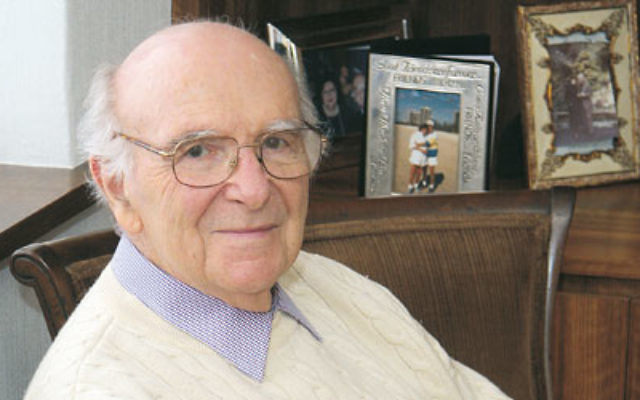In praise of a poet and storyteller
HOLOCAUST survivor Jacob Rosenberg was a poet, author and storyteller who died in October 2008, aged 86.
After years of writing poetry and prose in Yiddish, Rosenberg wanted to reach a wider audience and started writing in English.
His first book of poems in English was My Father’s Silence, published in 1994. After publishing two more collections of poetry, he wrote a book of short fiction, Lives and Embers (2003), his memoirs East of Time (2005) and Sunrise West (2007), and a novel, The Hollow Tree (2008).
Now some of Australia’s leading writers are paying tribute to Rosenberg in a new book being launched last week in Melbourne, titled Singing For All He’s Worth.
Editors Alex Skovron, Raimond Gaita and Alex Miller sought original pieces from people who knew Rosenberg well, including Jewish authors Arnold Zable, Richard Freadman, Danielle Charak and Rosenberg’s daughter Marcia Jacobs.
Among the other contributors are acclaimed author Helen Garner, Morag Fraser and Chris Wallace-Crabbe.
Skovron, who has published several collections of poetry and worked with Rosenberg as his editor for many years, said the contributors were prominent writers and intellectuals who were friends of Rosenberg.
“People were drawn to him – he had a wonderful gift for friendship and was a great raconteur.”
Rosenberg was born in Poland in 1922 and went to a state school until his formal education was cut short by the Nazi invasion.
The Rosenberg family was confined to the Lodz ghetto until August 1944, when they were transported to Auschwitz. Rosenberg spent two months in Auschwitz and the rest of the war in other camps – he was the only member of his family to survive.
After liberation, Rosenberg stayed in a displaced persons’ camp in Italy, where he met and married Esther Laufer, a survivor of the Warsaw Ghetto. In 1948 they migrated to Australia, settling in Melbourne.
The idea for the book came from Gaita, who proposed it to Skovron and Miller almost two years ago. Both immediately agreed and approached the publishing house, Pan Macmillan.
In the foreword to Singing For All He’s Worth, Gaita, who is a professorial fellow in the Melbourne law school and the faculty of arts at Melbourne University, wrote: “Even in Auschwitz his thirst for learning was almost as acute as his will to live, and whenever the opportunity arose he sought out professors and scholars among the camp’s inmates.
“That adds further layer to the many layers of meaning that resonate in Jacob’s quip that Auschwitz was his university.”
Skovron wrote in Singing For All He’s Worth: “Throughout his life he remained a prodigious reader, forever open to discovery and delight, be it fiction, philosophy, history, biography, the essayists, the magic realists, the classic and contemporary poets.
“He was equally at home with Kafka or Spinoza, George Orwell or Oscar Wilde, or for that matter with a good deal of Australian poetry; at the same time he was steeped in the Jewish sages and prophets, and was a passionate champion of the Yiddish language and its rich tradition.”
Skovron told The AJN that Rosenberg was a very motivated man who loved reading.
“Jacob was a humble man who was overwhelmed by the recognition he received for his books. He was pleased and proud of his success, but he always said that all he wanted was to become a better writer.”
Skovron and Rosenberg worked together for nearly 16 years.
“Jacob was a very important part of my life and we spent a lot of time together, not just on the editing but socially as well. We became like family.”
Jacobs, Rosenberg’s daughter, wrote in Singing For All He’s Worth that religious observance did not have a place in their home, despite his reverence of the traditional texts.
“Tanach was venerated as a historical narrative of the Jewish people rather than a source of divine revelation,” she wrote.
“Constantly invoking God and the biblical archetypes in his prose and poetry, he was much like his father before him. He was perhaps, or perhaps not, ‘a sworn atheist who quarrelled with God’.”
Jacobs wrote that until the end of his days, her father’s daily reading and studying of the Tanach and Midrash brought him immense satisfaction.
“I came to understand that his own body of work incorporated an ingrained secular worldview on the one hand, and on the other, a profound recognition of how deeply faith can permeate a life.”
Singing For All He’s Worth is published by Picador/Pan Macmillan. $24.99 (rrp).
REPORT by Danny Gocs
PHOTO: Poet and author Jacob Rosenberg, who died in 2008. Photo: AJN file/Peter Haskin


comments